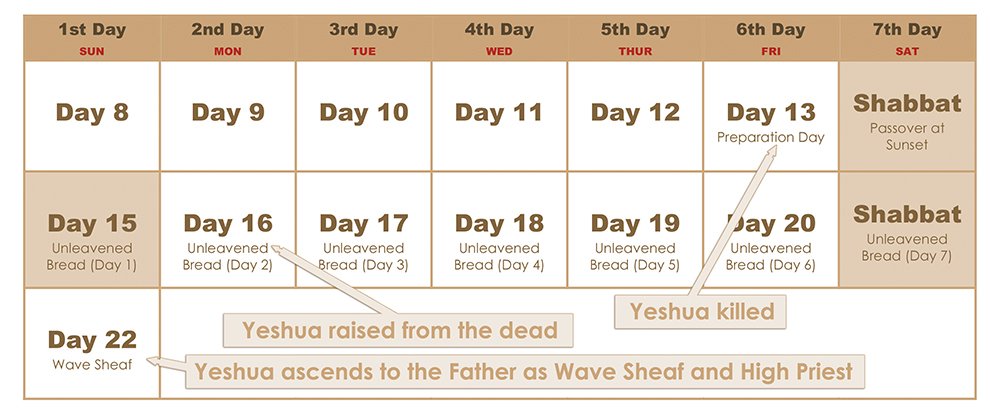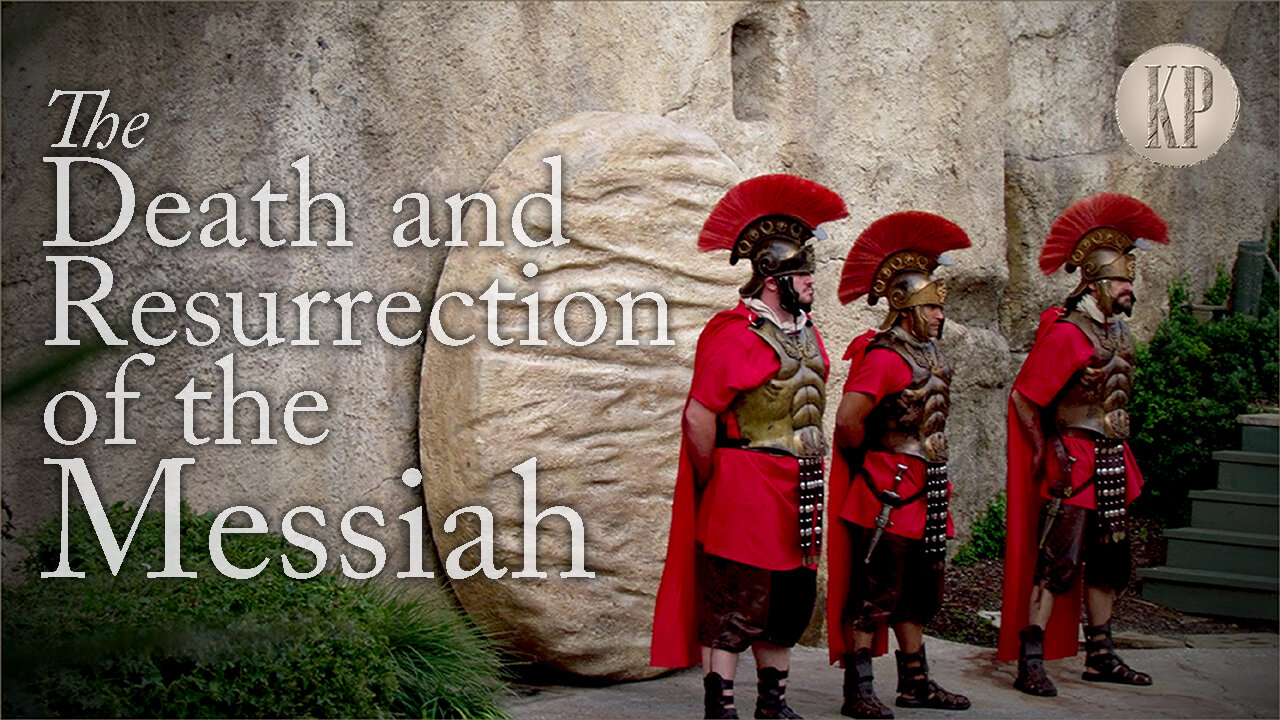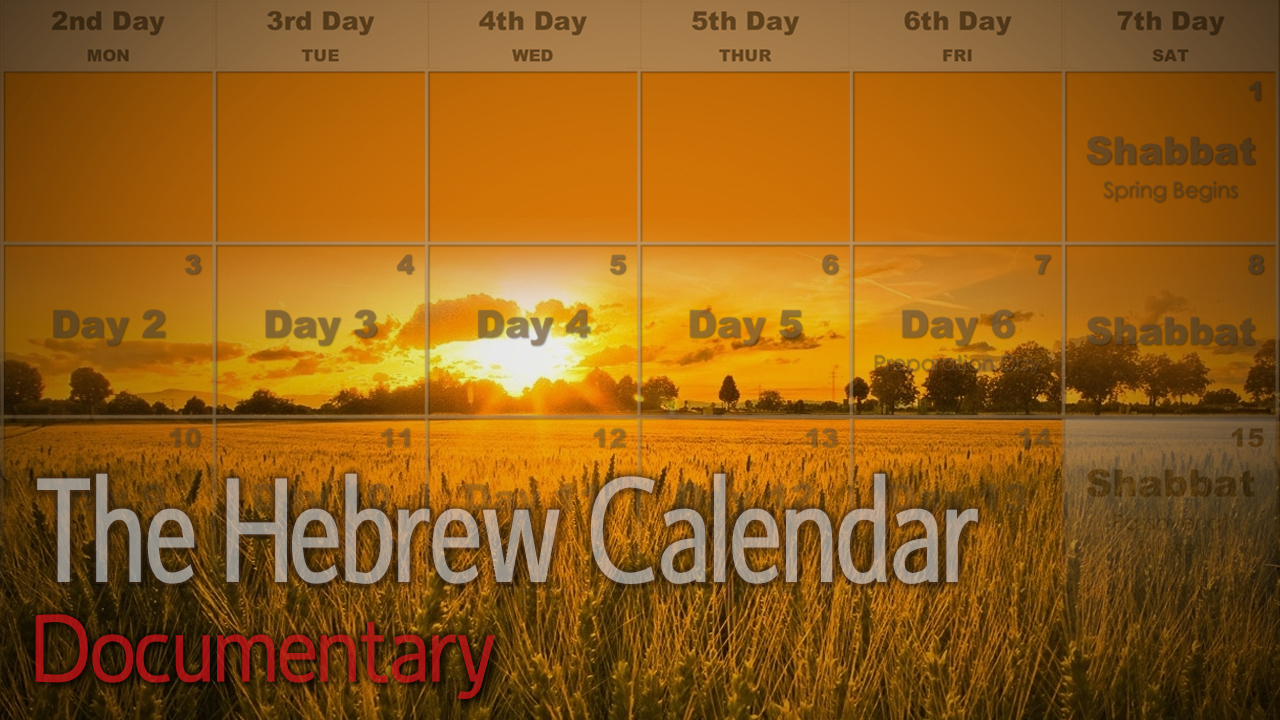For many years I have heard varying tales of when the Messiah was killed, placed in a tomb, and resurrected. The most popular narrative was the Christian one, which held the days between Friday evening and early Sunday morning, resulting in a time frame that is well shy of the required three days and three nights referenced in Matthew 12:
40For as Jonah was in the belly of the great fish for three days and three nights, so will the Son of Man be in the heart of the earth for three days and three nights.
Matthew 12:40
Others have since chimed in on this subject, offering alternative viewpoints, one of the most popular of which being the Wednesday staking and burial. They say the Messiah was killed on a Wednesday (a Passover, supposedly) buried that evening and spent Wednesday night, Thursday and Thursday night, Friday and Friday night, and Saturday in the tomb, totaling three days and three nights. Some claim the high day they were preparing for was one of the feast days that fell on a Thursday, since many label everything that is not a 7th-day Sabbath a “high day.” We have already elaborated on what a high day actually is in our article, What Constitutes a Day in Scripture, which we encourage you to read if you have not done so as yet.
Another popular notion used to support the Wednesday staking is a verse found in the book of Daniel, chapter 9 verse 27:
27"And he will make a firm covenant with the many for one week, but in the middle of the week he will put a stop to sacrifice and grain offering. . .” [emphasis mine].
Daniel 9:27
Yahushua, some say, died in the “middle of the week,” as proven in this verse from Daniel. But this verse speaks of a prophetic time frame that employs the day-for-a-year rule and thus refers to a period of 7 years, in the middle of which, the Messiah would be killed. To force the interpretation of this verse into a literal 7-day time frame breaks the prophetic rule of the passage, and the entire meaning is lost.
But that is not the only hole in this plot. For one thing, we know that high days refer to Sabbaths that are longer than usual, due to another day or evening’s event being tied to it, hence the meaning of the Greek word that “high” is derived from. And, as we have stated elsewhere, there are only two official high days on record. The high day of John 19:31 refers to one of two events.
We have provided a Hebrew Israelite Calendar for download in the sidebar, and on that calendar, you will see an interesting placement for the Passover observance; a placement that never changes from year to year, since Yah’s calendar is fixed, with days never floating. Watch our video, The Hebrew Calendar for more on that important subject. It can be accessed from this article page.
To be blunt, Passover always falls after the 7th Day Sabbath on the 14th Day of the first month. That’s not how we planned it. It just happened to line up that way, and it puzzled me at first, because it conflicted with everything I had understood before seriously and prayerfully tackling the subject of Yah’s calendar. But after seeing its placement and looking deeper into the reason behind it, many things started to make sense, and things that used to make sense, became gaping holes.
This next portion may be one of the most farfetched conclusions you experience from anything here at Kingdom Preppers, but bear with me. What I have found is that there is so much error to unlearn it is mindboggling. And I have been unlearning error for many years now. Not least is the Sabbath issue, which you can experience by watching Understanding the Sabbath or reading its companion article, which we have already referenced. Then there is the little fact of our true identity, which has been hidden and buried for many years. But this next tidbit was truly bizarre, yet incredibly interesting all the same.
First, think about this (and I have to admit, I never thought about it before myself): as stated in Understanding the Sabbath, the first week of creation was a literal 7-day week, which is proven from Scripture. Day 1, what we call Sunday, was first, ending with the Sabbath on the 7th day. If you can wrap your head around that, then let’s take it a bit farther. That same Day 1 was the first day of the month! And that month, was the first month of the year, meaning it was also Day 1 of the year! So, if we do a simple count, and say that this is the month that the first pure convocations are to be held, Day 1, Gregorian Sunday, is first, and Day 7 is the Shabbat.

The very next day, Day 8 of the month would be Day 1 of week 2, another Gregorian Sunday, and the next Shabbat would be Day 14 of the month, and the 7th Day of week 2.
And what is Day 14 of the first month? That’s right: Passover, which falls in the evening!

Looking at the above image, it makes even more sense why it is stated in John 19:
31Then the people of Judah, because it was the day of preparation, so that the bodies would not remain on the stake on the Sabbath (for that Sabbath was a high day), asked Pilate that their legs might be broken, and that they might be taken away.
John 19:31
That high day, as it turns out, stretched from Sabbath morning, through Passover evening and night, all the way to Unleavened Bread evening, making for a full 36 hours before those who celebrated the feasts would be able to do anything about the bodies on the stakes. But what about the famed quotes from all four Good News books, which see people coming to the tomb on the supposed early morning of the first day following the Friday staking? (And yes, I believe Yahushua was indeed staked on a Friday.)
Matthew 28:1; Mark 16:1-2; Luke 24:1, and John 20:1 all recount the events of an early morning visit to the tomb, but there is something interesting in the original wording of all four verses that prove extremely revealing. While all these passages pretty much say the same thing, the clearest picture is painted in Matthew’s account.
Now, Matthew 28 verse 1 contains a phrase that has been debated for quite some time now. For one thing, one Greek word which is used twice in the verse with the same exact spelling is translated in two very different ways, which is very suspect on the surface. The word I’m referring to is sabbatōn, which is written like in two places in Matthew 28:1:
σαββάτων
This word cannot be translated two different ways, and the translators respected this in many other areas where the same Greek word was used twice in the same passage. But in Matthew 28:1, sabbatōn is translated as both “Sabbath” and “week,” but the Greek word used to actually refer to a Sabbath is not usually sabbatōn, but sabbatō, which looks like this:
σαββάτῳ
But getting back to Matthew 28:1, I’ll break it down word for word from the Greek text and its transliteration, with the associated meanings and Strong’s numbers listed as well, so they could be looked up in the Blue Letter Bible, which we also link to from the FAQ page.
Ὀψὲ G3796 Opse (A long time after)
δὲ G1161 de (And now)
σαββάτων G4521 sabbatōn (week)
τῇ G3588 tē (the)
ἐπιφωσκούσῃ G2020 epiphōskousē (to dawn)
εἰς G1519 gis (into)
μίαν G1520 main (one)
σαββάτων G4521 sabbatōn (week)
ἦλθεν G2064 ēlthen (came)
Μαριὰμ G3137 Mariam (Mary)
ἡ G3588 hē (the)
Μαγδαληνὴ G3094 Magdalēnē (woman of Magdala)
καὶ G2532 kai (and)
ἡ G3588 hē (the)
ἄλλη G243 allē (other)
Μαρία G3137 Mariam (Mary)
θεωρῆσαι G2334 theōrēsai (look at)
τὸν G3588 ton (the)
τάφον G5028 taphon (sepulcher)
To paraphrase, what this sentence actually says is:
“And now, a long time after, one week having dawned into a new week, came Mary, the woman of Magdala, and the other Mary to look at the sepulcher.”
Note that it starts with, “A long time after.” But a long time after what exactly? The very last verse of the previous chapter of Matthew gives us the answer:
66And they went and made the grave secure, and along with the guard they set a seal on the stone.
Matthew 27:66
So, this event did not take place right after Yahushua’s grave was sealed and guarded. The understanding gained from the original text informs us that an entire week had passed before the two Marys made their way to the tomb. But, why an entire week? Well, two things are fulfilled by this event; the first instance is associated with a law that concerns defilement during the feast of Passover:
4So Moses told the people to celebrate the Passover 5in the wilderness of Sinai as twilight fell on the fourteenth day of the month. And they celebrated the festival there, just as Yah had commanded Moses.
6But some of the men had been ceremonially defiled by touching a dead body, so they could not celebrate the Passover that day. They came to Moses and Aaron that day 7and said, “We have become ceremonially unclean by touching a dead body. But why should we be prevented from presenting Yah’s offering at the proper time with the rest of the Israelites?”
8Moses answered, “Wait here until I have received instructions for you from Yah.”
9This was Yah’s reply to Moses. 10“Give the following instructions to the people of Israel: If any of the people now or in future generations are ceremonially unclean at Passover time because of touching a dead body, or if they are on a journey and cannot be present at the ceremony, they may still celebrate Yah’s Passover. 11They must offer the Passover sacrifice one month later, at twilight on the fourteenth day of the second month.
Numbers 9:4-11
So, coming into contact with a dead body would prevent Israelites from partaking of the Passover feast and Unleavened Bread, forcing them to observe those days a month later. But a simpler expression of this type of law is mentioned in Numbers 19:
11“The one who touches the corpse of any person shall be unclean for seven days. “
Numbers 19:11
On the preparation day that Yahushua was killed, with the Passover looming the next day, and seven days of Unleavened Bread directly following, those who visited the tomb could not risk coming into contact with a dead body and therefore defile themselves for the duration of the feast, which had yet to commence!
Secondly, Wave Sheaf, as we covered in the enhanced scripture study video, The Pure Convocations, falls on the 1st Day of the Week (Sunday) directly following the 7th and final day of Unleavened Bread. This came a little over a week following the events of the preparation day staking of Yahushua. If he ascended the Sunday directly following the preparation day of that week, that would not have been the day of Wave Sheaf.

So, following his resurrection, Yahushua bided his time on earth in some way, and on the 1st Day of the following week, which was Wave Sheaf, he ascended to the Father as the Wave Sheaf and High Priest, fulfilling two important roles in the highest spiritual sense. Now some might argue, “But Yahushua didn’t die on the actual Passover. That means he didn’t fulfill Passover.” Well, if you watch The Pure Convocations you’ll see that he did in fact fulfill Passover in the highest spiritual sense, being, as Revelation 13:8 terms it, “the lamb that had been slaughtered since the foundation of the world.”
What is more, the term preparation day, which is used in Matthew 27:62; Mark 15:42; Luke 23:54; and John 19:14, 31, and 42, only refers to the sixth day of the week which precedes the Sabbath, and is never used to refer to a day before a pure convocation, except when that convocation falls on the 7th Day Sabbath, as Passover did, and does today. It stems from the law found in Exodus 16:5, which relates solely to the 7th Day Sabbath:
5“On the sixth day, when they prepare what they bring in, it will be twice as much as they gather daily.”
Exodus 16:5
The word prepare used in the verse above is written as wə·hê·ḵî·nū in the Hebrew transliteration, ḵî·nū arising from kun, word H3559, which carries the meaning, to be prepared. And John 19:14 expresses the truth found in the second and third Hebrew calendar charts above, that the 6th Day of the week, the preparation, preceded a 7th Day Sabbath, on which Passover fell:
14Now it was the day of preparation for the Passover; it was about the sixth hour. And he said to the Jews, “Behold, your King!”
John 19:14
Because the Passover falls at the end of a 7th Day Sabbath, the people of Israel had to prepare for it an entire day earlier, on Day 13 of the month, or the 6th Day of the week. I realize that all of this might be difficult to grasp, or even accept, but I’m sharing these things in the hope that it will enlighten you and sharpen your understanding of the calendar of Yah.
Bonus Topic:
Related Articles:
Feedback Form
companion videos
TESTIMONIALS
Happy Sabbath my brother. Once again you have shaken my foundation with your lesson on The Death and Resurrection of the Messiah. I ask myself what do I really know as I humble myself under Yah's teachings. Thank you once again for the Word's inspired teaching. One thing: the article seems unfinished but it has inspired me to dig deeper into the Word. Yah's blessing be with you and your household in all that you seek to do to wake up Israel.
—Kervin N.









